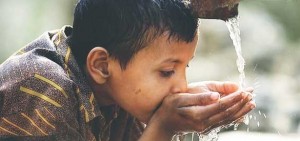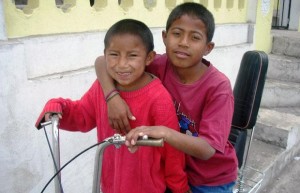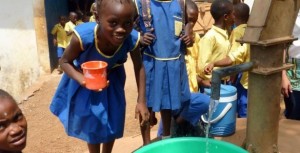(MissionNewswire) Peru faces high levels of income inequality and has more than a quarter of its population living in poverty, according to the World Bank. Poverty levels are significantly higher in rural areas but urban areas struggle most with inequality, most notably metropolitan Lima, the capital
(MissionNewswire) Salesian Missions has launched a special fundraising initiative to address the need safe water and sanitation to support its work in countries around the globe. From drinking water and healthy sanitation to agriculture, water is essential for life. According to a leading water charities,
(MissionNewswire) Bolivia is the poorest country in South America and also has the most unequal income distribution on the continent. According to UNICEF, 60 percent of Bolivians live below the poverty line with 40 percent of those living in extreme poverty. The poverty rate is higher
(MissionNewswire) From safe drinking water and healthy sanitation to agriculture, water is essential for life. Six to 8 million people die annually from the consequences of disasters and water-related diseases, according to the United Nations. Furthermore, 783 million people do not have access to
(MissionNewswire) Each year, on Dec. 5th, International Volunteer Day is celebrated throughout the world. This day was founded to honor and recognize volunteers and volunteer organizations that have committed to making the world a better place by donating their time and talents. This year’s focus is
(MissionNewswire) Each year, Oct. 16, marks the observance of United Nations World Food Day across the globe. Today, nearly 870 million people around the world are chronically undernourished, or one in eight individuals worldwide, according to a new report published by the United Nations. World
(MissionNewswire) International Women’s Day—created by the United Nations and celebrated by organizations and countries around the globe—is observed each year on March 8. According to the United Nations, “it is a day when women are recognized for their achievements without regard to divisions, whether national,
POST TAGS:
“Madres Project”“Madres Project” in Santo Domingo“Right to Dream” program“Unwind Your Mind” campsBoliviaCaritas ItalianaColombiaDidiaDominican RepublicFather Mark HydeFoundation for Advancement of Indigenous Women in GuatemalaGhanaGirls in the VanguardGuatemalaHuman Development Report on GenderIndiaInternational Women’s DayKakuma Refugee CampKenyaMayansMedellinMexicoMexico CityOdumasePan-American Health OrganizationPeruPhilippinesPuneruralRural Q’echiSouth AfricaTalita KumiTanzaniaTuloy FoundationUNHCRUNICEFUnited NationsUSAID
(MissionNewswire) According to UNICEF, almost 50 percent of the developing world’s population – 2.5 billion people – lack improved sanitation facilities, and more than 884 million people still use unsafe drinking water sources. Inadequate access to safe water and sanitation services, coupled with poor hygiene practices, kills and sickens thousands of children every day, and leads to impoverishment and diminished opportunities for thousands more.
Poor sanitation, water and hygiene have many other serious repercussions. Children – and particularly girls – are denied their right to education because schools lack private and decent sanitation facilities. Women are forced to spend large parts of their day fetching water. Poor farmers and wage earners are less productive due to illness, health systems are overwhelmed and national economies suffer. Without WASH (water, sanitation and hygiene), sustainable development is impossible.
Reports published by the World Health Organization, UNICEF and others make it clear that this challenge should no longer be left primarily in the hands of just water management authorities or environmental ministries.
Non-governmental organizations must continue to play a major role in fighting the battle for access to clean water. Many such organizations around the globe have been doing just that, one project and one community at a time.
In a Bolivian community, for example, families now have access to safe drinking water in their homes through community water distribution projects, according to the Salesian Missions website.
In the town of “19 de Agosto” in Santa Cruz de la Sierra, the new distribution brings water directly to 106 families who previously had to carry potable water from the town well to their own homes, According to the Salesian Missions website. The distribution system greatly improves the sanitary conditions of the drinking water. In the town of Las Parabas, 50 families now have water distribution directly into their homes using this system.
Each community and each challenge to safe water access is different and customized solutions must be engineered, the website also points out. For example, to address serious water issues resulting from pesticide pollution in a remote area of western Brazil, Salesian Missions worked with members of the Xavante and Bororo Indian communities to obtain clean water from previously inaccessible areas.
To do so, the Salesians first created wells and designed a mobile drilling truck. Then, to create power, they invented and patented a seesaw pump that would draw water from the depths of the well as children were playing. Now, solar panels are used. The result – according to Salesian Missions – is reduced risk of disease, access to potable water, improved infrastructure and expanded farming.
“What began as an immediate response to a crisis in a community,” the website states, “has become a well-organized project to ensure the growth of the indigenous groups.”
(MissionNewswire) Developing countries could double their food production within 10 years with support for ecological agriculture, according a recent United Nations report. The report, which was presented to the U.N. Human Rights Council, found that “Agroecological” (or “eco-farming”) projects have led to an average crop yield
(MissionNewswire) Wide smiles break out on the faces of students crouching in the fields as they examine the crops. They know the vegetables they hold in their hands will provide their communities and country with a quality food source, as well as increase





